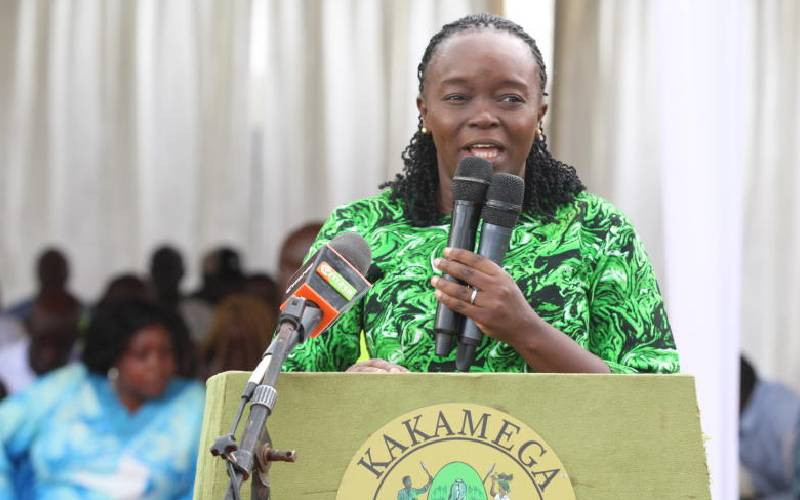
As emotive as money is, and as thick as blood is perceived to be, dealings in this context are always fogged with guilt. [Courtesy]
If logic is to be applied in the medieval saying ‘blood is thicker than water’, then this proverb would be found to have loopholes inapplicable in some instances of the modern society.
For instance, how much sacrifice should you make when it comes to family and your money? Remember this is your sweat, blood and tears – and some of your relatives have no idea how hard you have worked to earn it.
How much black tax is enough? Or are there instances you should ring-fence your finances to keep relatives away?
These instances are some of the impurities that may end up making water to be either as thick as blood or even thicker since one may find it easier to deal with ‘outsiders’ when it comes to money than their own family.
As emotive as money is, and as thick as blood is perceived to be, as personal finance expert and money coach Edith Siddondo puts it, dealings in this context are always fogged with guilt.
She notes that for one to have a clean slate when money is a topic of discussion with relatives, guilt has to be dealt with.
Guilt plays a big role
Whether you are giving out money or not, guilt plays a big role – you may give out of guilt or feel guilty for not giving.
“I would say that’s the biggest contrast in setting financial boundaries with family over friends,” says Siddondo, the chief executive officer of Profit Acumen, a money coaching firm.
Siddondo says family tends to come with a lot more strings and a lot more guilt which means when you want to set a money boundary, you are quickly faced with comments like: “Well, I paid for you to go to school” or “Yeah? Well you owe me 18 years’ worth of grocery money!” or “You treated me like a convenient ATM when I was working!” or worse.
Siddondo says we cannot be responsible for the lack of money boundaries others had with us. As a result, you should not be punished for it.

Are there instances you should ring-fence your finances to keep relatives away? [Courtesy]
Problem of codependency
“Two wrongs do not make a right. These wrongs are what are ailing our society today and cascading a generational problem of codependency. It is that time to change how we relate with money so that we can all win with it,” she says.
“It is a lot better to set a boundary ‘even if it upsets someone’, than to risk your own health and wellbeing by giving from an empty cup.”
Setting these boundaries may be a challenge since our relationship with money is almost intertwined with blood relations and this is depicted in the latest financial access report.
According to the 2021 FinAccess Household Survey released in December 2021, friends and family are the first to go people for individuals seeking financial advice.
From the report, more people prefer seeking financial advice from friends and family, than from other sources like experts.
Family and friends seem to be the best source of financial advice–and to some the only source – and if this does not work, the next option is they become their own consultants.
The survey shows 43 per cent of the population in 2021 would rather consult themselves or nobody else. The other options are media and advertisements (3.6 per cent), formal financial institutions (2.9 per cent) and group chama (1.9 per cent).
“In terms of demographics, 50 per cent of females and 39.7 per cent of males receive financial advice from friends/family. In terms of use of own knowledge in making financial decision, 39.1 percent of respondents were female and 47.8 per cent of male,” reads the findings.
The survey adds that when assessed by the level of education, 50 per cent of the population with no education and 46.6 percent with secondary education relied on friends/family for advice when making a financial decision in terms of rural-urban divide.
Some 46.5 per cent of residents in rural areas depended on friends/family in decision making on financial matters compared to 42.4 per cent in urban areas.
Financial advice
Elizabeth Irungu, a financial expert and economist notes that asking others for advice is not wrong.
“… it is still fine for you to ask relatives especially if they are the ones financing you (in business). It is very important for them to be involved. They are stakeholders,” she said during an interview with The Standard’s sister platform KTN.
While consulting relatives is still fine, in terms of the nitty-gritty of the business, Irungu says your banker will be your first point of reference because you need some form of research and background work that would cement your decision.
“Sometimes you can say – I am going to buy a motorbike –but you have not done any research. You are doing it just because every other young man in your village has a motorbike and you decide to take the same route,” she explains.

Setting these boundaries may be a challenge since our relationship with money is almost intertwined with blood relations. [Courtesy]
Invest in an idea
Irungu advices individuals to invest in an idea that will solve an existing problem in the market.
As a financial expert conversant on investment and money, Irungu says if she was to offer advice in such a case, she would inquire how saturated the field is before one adds another motorbike.
“Upon doing your research, you will find that it is not a good idea for you to go into that overcrowded space,” she says.
Pride in being depended on
For some, as Siddondo puts it, there is pride in being depended on. As such, these individuals exert some control attached to the help they give to people. They may use their financial muscle to manipulate people too.
“The “control through money” narrative is where a lot of negative money messages get passed down generationally and this does a great dis-service to our society,” she says.
Siddondo says when we attempt to help another person financially as enablers, we are denying them the opportunity to grow from their own financial situations. We make them to rely on us financially.
“Unless the pattern of financial codependency stops, it becomes a financial enmeshment that is difficult to change and it disempowers humanity,” she notes.
To break from this entanglement, the first thing one needs to do, Siddondo advises, is to figure out their money goals and write them down.
“Then think about where you feel anger, resentment, stress, fear, worry, or unease around money and your relationships,” she details.
“Write down what comes up for you. Then create your own list of money boundaries that can act as a guiding set of rules for you moving forward towards your desired money goals.”
She however stresses that every situation is unique. There is no one size fits all answer to this.
“If you feel good about taking care of your family financially, then by all means, go for it,” says Siddondo.
”But if they are impacting you negatively, money boundaries need to be put in place.”
 The Standard Group Plc is a multi-media organization with investments in media platforms spanning newspaper print
operations, television, radio broadcasting, digital and online services. The Standard Group is recognized as a
leading multi-media house in Kenya with a key influence in matters of national and international interest.
The Standard Group Plc is a multi-media organization with investments in media platforms spanning newspaper print
operations, television, radio broadcasting, digital and online services. The Standard Group is recognized as a
leading multi-media house in Kenya with a key influence in matters of national and international interest.











